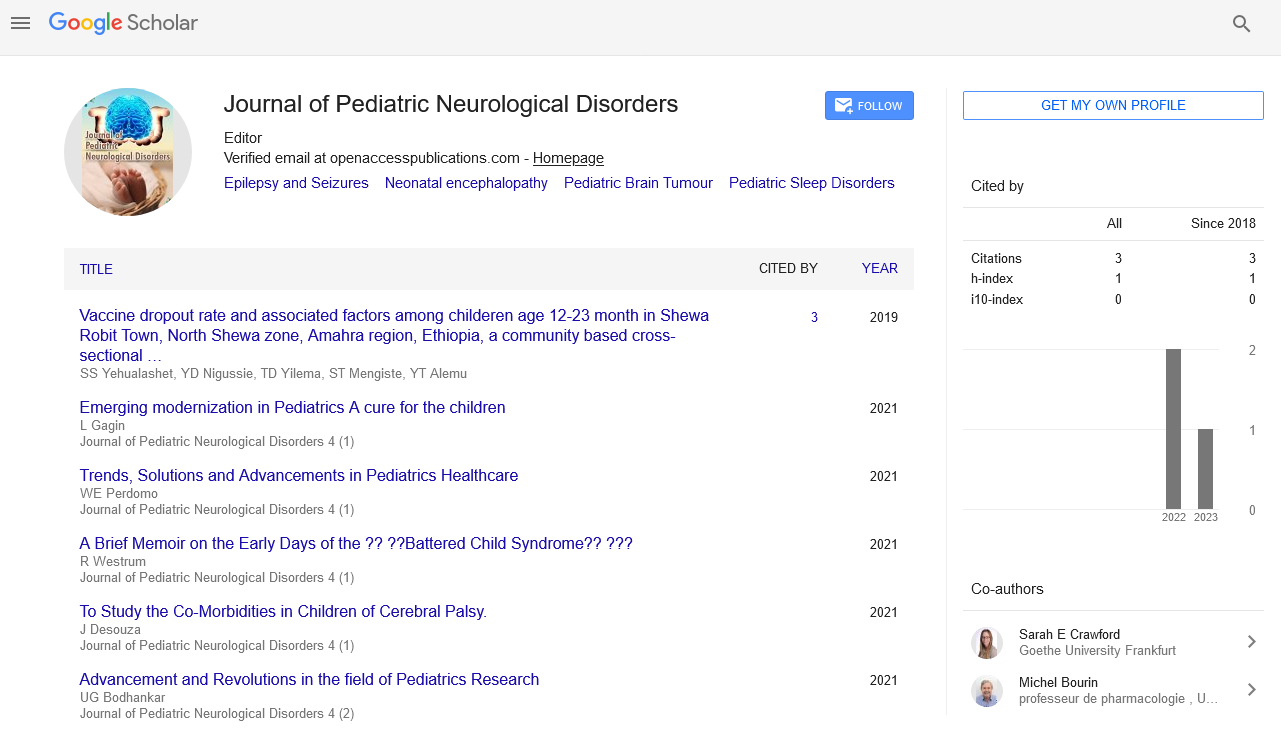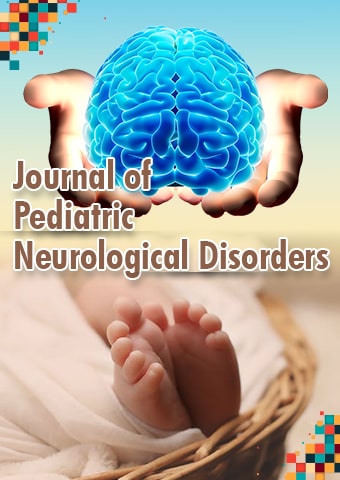Review Article - Journal of Pediatric Neurological Disorders (2023) Volume 6, Issue 3
Origin of Mental illness in Fetus
Erin Mazhar*
Istanbul University, Turkey
Istanbul University, Turkey
E-mail: mazarerin@iu.ac.tr
Received: 01-June-2023, Manuscript No. pnn-23-103358; Editor assigned: 05-June-2023, PreQC No. pnn-23- 103358(PQ); Reviewed: 19- June- 2023, QC No. pnn-23-103358; Revised: 21-Apr-2023, Manuscript No. pnn-23-103358; Published: 28-June-2023, DOI: 10.37532/ pnn.2023.6(3).48-50
Abstract
Due to significant clinical and research gaps, the effect of infections and inflammation during pregnancy on the developing fetal brain is still poorly understood. Toxoplasma gondii, rubella virus, Cytomegalovirus (CMV), and herpes simplex virus are the classic infectious TORCH pathogens that are known to be directly teratogenicity. However, new evidence suggests that these infections are just one extreme end of a much wider range of injuries. Prenatal exposure to a variety of viral and bacterial infections, or simply inflammation, may subtly alter fetal brain development, resulting in neuropsychiatric consequences for the child later in life, according to the evidence presented here. Over 30 years ago, a connection was made between influenza infections in pregnant women and an increased risk of schizophrenia in their children. Since then, there is evidence that a variety of infections during pregnancy may also make the child more likely to have autism spectrum disorder and depression. After that, research on animal models showed that both infections during pregnancy and inflammation can damage neurons and neural progenitor cells directly or indirectly by activating microglia and astrocytes, which can cause cytokine production and oxidative stress. Placental serotonin production can also be altered by infectious exposures, which can disrupt neurotransmitter signaling in the developing brain. It is difficult to detect these subtle brain injuries in a clinical setting. Our construct for defining teratogenic infections in pregnancy (such as TORCH) based on congenital anomalies is insufficient to capture the full adverse impact on the child because the neuropsychiatric impact of perinatal infections or inflammation may not be known until decades after birth.
Keywords
Teratogenic infections • Inflammation • Neuropsychiatric• Autism spectrum disorder • Microglia • Astrocytes
Introduction
Although it is unclear how infection and inflammation affect the developing brain of a fetus, it is believed to raise the lifetime risk of certain mental illnesses. By the 1960s, several studies found a slight increase in the incidence of schizophrenia among children and adults who had been born during the winter months in both northern and southern hemispheres, suggesting a link with viral infections more prevalent during the winter.These observations led to a “seasonality of birth” hypothesis suggesting that some proportion of adult schizophrenia was caused by virus-induced fetal brain injury.9 Subsequent studies in humans and mouse models linked prenatal exposure to single pathogens, complex infections, and Because of this evidence, infectious risks during pregnancy that are not caused by TORCH pathogens need to be rethought. What is currently known about the infectious and inflammatory causes of mental illness in fetuses is the focus of this review. We likewise talk about the clinical and research ramifications of how we could reexamine contamination avoidance and treatment with an accentuation on safeguarding the fetal cerebrum [1].
Fetal brain injury
Numerous bacteria, viruses, and parasites have the potential to injure the fetal brain either directly or indirectly, resulting in mild or severe neurodevelopmental injuries. By crossing the placenta and concentrating within the fetal compartment, the classic TORCH infections are known to directly harm fetal brain cells. However, many infectious diseases can also damage the fetus's central nervous system indirectly by increasing the fetal inflammatory response, activating astrocytes and microglia, which in turn causes cytokine release, apoptosis, growth inhibition, and direct cellular damage.Placental inflammation is a key characteristic of fetal brain injury. Fetal cytokines, neurotransmitters, or excitotoxic metabolites can harm the fetus's brain as a result of the transfer of inflammatory mediators or cells from the placenta to the fetus. We examine the connection between perinatal infections, placental inflammation, activation of astrocytes and microglia in the fetal brain, genetic predisposition, and epigenetic modifications in order to comprehend the pathogenesis of subtle fetal brain injuries that increase the risk of mental illness in the future [2].
Inflammation of the placenta
Evidence strongly suggests that the immunologic milieu of the placenta plays a significant role in neurodevelopment, one of the mechanisms implicated in fetal brain injury. A recent study demonstrated that many perinatal complications, including infections, can upregulate transcriptional programs in the placenta involved in oxidative stress response, synaptic function, and cellular metabolism. Suggestively, these same genetic loci are critical for normal neurodevelopment and are also independently upregulated in patients with schizophrenia. This suggests that placental mediation of immune activation is the cause of the higher concordance of schizophrenia among monochorionic twins sharing one placenta compared to dich A diagnosis of schizophrenia was most likely when a patient with a high genetic risk also experienced a perinatal complication, as the genetic risk for schizophrenia appears to be mediated by these perinatal complications; Males were more affected by this. These results suggest that pregnancy complications and possibly inflammation may alter transcriptional program regulation in the placenta, increasing the likelihood of schizophrenia development [3, 4].
Regulated serotonergic activity
Neurotransmitters, which are linked to both normal and abnormal fetal brain development, are known to be secreted by the placenta. Maternal inflammation has also been shown in animal studies to alter dopaminergic and GABAergic activity in the fetal brain, which correlates with observations from human studies in people with schizophrenia and ASD. Lastly, maternal immune activation may also change development of cholinergic neurons in the fetal basal forebrain. Fascinatingly, this process appears to occur in the absence of increased levels of inflammatory cytokines within the fetal brain. An active area of research is the connection between the development of the fetal brain, placental neurotransmitter secretion, and maternal infections or inflammation [5, 6].
Activation of innate immune system
In many animal studies, maternal inflammation induces microglial activation in the fetal brain, although these findings have not been universally replicated. In vitro studies have demonstrated increased neurotoxic cytokine release from activated microglia, which may damage or kill neurons and glia [7, 8]. There have been findings of microglial activation in schizophrenia, though again with substantial inconsistencies, and some work has examined the role of microglia in bipolar disorder A perinatal influenza infection also increases these channels' expression in the fetal mouse brain. Depression, schizophrenia, and astrocyte dysfunction are also under investigation [9, 10].
Conclusion
The brain may be the most vulnerable fetal organ to infectious and environmental insults throughout the entire pregnancy, as fetal brain development continues past birth. The nature of how fetal exposure to infections or maternal immune activation might synergistically increase the risk of these disorders with other risk factors (such as genetics) remains understudied. Lastly, the weight of the growing body of scientific evidence has not matched the clinical emphasis on protecting the fetal brain from infections and inflammation during pregnancy. As a safe way to protect both the mother and the fetus from severe illness, obstetricians should make sure that pregnant women get the influenza vaccine, even in the first trimester. Both human cohorts and animal studies will be required to correlate the complex biological events linking perinatal infections with fetal brain injury in order to determine the need for additional interventions to reduce the risk of neuropsychiatric disorders in the fetus.
References
- McAlister Gregg N, Banatvala R. Congenital cataract following German measles in the mother. Rev Med Virol. 11,277-285 (2001).
- Cluver C, Meyer R, Odendaal H et al. Congenital rubella with agenesis of the inferior cerebellar vermis and total anomalous pulmonary venous drainage. Ultrasound Obstet Gynecol. 42, 235-237 (2013).
- Parker G, Neilson M. Mental Disorder and Season of Birth—A Southern Hemisphere Study. Br J Psychiatry. 129, 355–361 (1976).
- Atladóttir HÓ, Thorsen P et al. Maternal infection requiring hospitalization during pregnancy and autism spectrum disorders. J Autism Dev Disord. 40, 1423-1430 (2010).
- Brown AS, Derkits EJ. Prenatal infection and schizophrenia: a review of epidemiologic and translational studies. Am J Psychiatry. 167, 261-280 (2010).
- Niemela S, Sourander A, Surcel HM et al. Prenatal Nicotine Exposure and Risk of Schizophrenia Among Offspring in a National Birth Cohort. Am J Psychiatry. 173, 799-806 (2016).
- Machón RA, Mednick SA, Schulsinger F. The Interaction of Seasonality, Place of Birth, Genetic Risk and Subsequent Schizophrenia in a High Risk Sample. Br J Psychiatry.
- Tochigi M, Okazaki Y, Kato N et al. What causes seasonality of birth in schizophrenia? Neurosci Res. 48, 1-11 (2004).
- Mednick SA, Machon RA, Huttunen MO et al. Adult schizophrenia following prenatal exposure to an influenza epidemic. Arch Gen Psychiatry. 45, 189-192 (1988).
- Brown AS, Schaefer CA, Quesen berry CP et al. Maternal Exposure to Toxoplasmosis and Risk of Schizophrenia in Adult Offspring. Am J Psychiatry. 162, 767-773 (2005).
Indexed at, Google Scholar, Crossref
Indexed at, Google Scholar, Crossref
Indexed at, Google Scholar, Crossref
Indexed at, Google Scholar, Crossref
Indexed at, Google Scholar, Crossref
Indexed at, Google Scholar, Crossref
Indexed at, Google Scholar, Crossref
Indexed at, Google Scholar, Crossref
Indexed at, Google Scholar, Crossref

